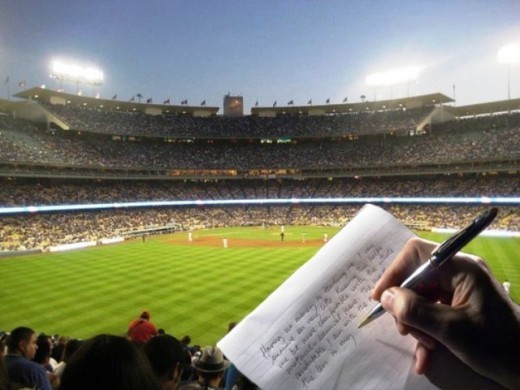What You Need to Do to Become a Successful Sports Journalist?

Introduction
Would you like to work for the toy department of a news organization? Are you wondering, what does the toy department have to do with a news organization? Department that deals with sports news in any news organization is mockingly called toy department because a sports reporting contains not only information but also a little informal narration and more entertainment. Journalists associated with the sports section are commonly known as sports journalists.
A sports journalist, though can be little informal and sports enthusiastic, must possess full details of games including rules, playing techniques, required skills and knowledge to play, and so on. Once these details are in the hands, the sports journalist should be able to observe games keenly and write down important events interestingly.
Writing about a player
While narrating a sport or game, you cannot omit athletes or players who demonstrate an outstanding performance. However, writing about a particular player needs extra care because wrong information or derogatory remarks about a particular person may cost you huge. First, be unbiased while evaluating an individual’s performance. Before starting to write, it is pertinent to gather necessary information about the player such as ‘who, what and how’. The information may include who is the player, what is her special skills, previous achievements, what is her limitation, improvements, previous performances, special techniques used to achieve and how she performs now. If you are equipped with all these details, you will be able to surprise your readers by a remarkable story.
Three Golden Rules
Sports journalists do not have home country
No matter which country you belong to; when you review a sport or game, be neutral. A biased sports reporting may erupt unwanted disturbances or violence, and put your fame at stake.
Sports journalists do not have emotions
In a sports reporting, there is no place for your own prejudices. A sports journalist could be enthusiastic and informal but should be able to control emotions. Personal feelings often lead to biased narration and the report becomes a piece of personal opinion.
Readers are smarter
Never forget the point that your readers know things better than you do. Hence, be informative and precise in your writings.
Prerequisites for an excellent sports review
If you are in a position to review a game, it is crucial to do some homework. Here, homework is nothing but gathering adequate information about the game. What is that adequate information? The following is the checklist for an efficient sports review:
1. Who are the players? What are their previous accomplishments?
2. How did the player achieve each score previously?
3. What was the technical competence (unique skills) of the player in the previous games?
4. What were the remarkable skills of the player that led to success in the previous games?
5. Did the player involve in any disputes in the previous games? How were the disputes resolved?
6. What are the experts’ opinions about a particular player? Is the player subject any vehement criticism?
7. What are the accomplishments of the player until now from her entry? Is the player famous for any non-sports activities? What are those activities?
8. What are the best and worst performances of the player? How did it happen?
9. What is the breakthrough for the player? What made her to achieve such a breakthrough?
10. How did the player perform at the end of the game or at a critical situation previously? What are the emotional elements of the player?
11. Did the emotional elements of the player create any interesting events previously? What is that event?
12. Did the player meet with any accident in the previous games? If any, what happened to her and team?
13. What is the strength of the gathering in the playground? What is the mood of the audience?
14. How did the player perform in her home country previously? How was her performance outside her home country?
15. What is the climatic condition before or during the game? How would the climatic condition influence the game?
16. Who are the judges, umpires, referees and so on? What are their qualifications? What are the experts’ opinions about them? Are they subject to any criticism?
If you possess all aforementioned information before reviewing a game or sport, you will be more confident on what you are writing; you will be able to provide your readers with interesting information, which will take you to the next level in your career.
© 2014 Sundaram Ponnusamy








